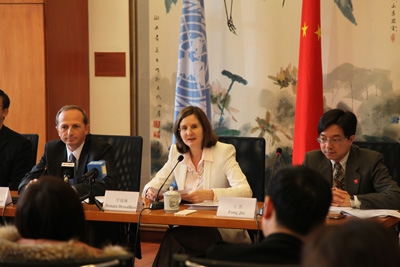2013 Human Development Report released

UN Resident Coordinator and UNDP Resident Representative Renata Dessallien giving a speech at the report’s launch
/UNDP
On March 15th, the United Nations Development Project (UNDP) China participated in the worldwide release the 2013 Human Development Report, “The Rise of the South: Human Development in a Diverse World” and held a launch event in Beijing.
“The Report notes that, over the last decade, all countries accelerated their achievements in the education, health, and income dimensions as measured in the Human Development Index (HDI)——to the extent that no country for which data was available had a lower HDI value in 2012 than in 2000,” Helen Clark, administrator of the United Nations Development Program wrote in the foreword.
In China, the HDI increased from 0.695 in 2011 to 0.699, staying above both regional and BRICS averages, at 0.683 and 0.655 respectively. Globally, China’s HDI ranking remained the same, at 101 out of 187 countries. The new HDI figure represents a remarkable increase of 72 percent from 0.407 in 1980, or about 1.7 percent annually. Li Wen, deputy director-general of the Institute of Global Strategy and Asia-Pacific Studies at the Chinese Academy of Social Sciences, said that the figures are objective and scientific. Since its reengagement with the international community, the increase in China’s HDI corresponds closely to China’s evolving role in and contribution therein..
According to the report, the rise of the South “is unprecedented in its speed and scale. It noted that such dramatic changes in such a short period of time in terms of living conditions and prospects for so many people has never before occurred in world history.
The report emphasizes the degree to which China has contributed to the dynamics of world economy. It notes that by 2020, sustained economic growth in China, India and Brazil will lead those countries’ combined economic output to match the cumulative GDP of Canada, France, Germany, Italy, the United Kingdom and the United States for the first time in 150 years.
In the press release, the UNDP China noted that “These economic advances have been matched by correspondingly impressive human development achievements. China has now lifted over 510 million people out of poverty since 1990, and has seen the proportion of the population living on less than US$1.25 a day fall from 60.2 percent in 1990 to 13.1 percent in 2005.” In fact, China met its Millennium Development Goal target of reducing poverty relative to 1990 levels by half three years before the 2015 deadline for the goal.
Fang Jin, deputy secretary-general of the China Development Research Foundation envisions three areas in particular where China can play a positive role in the future. Firstly, China can actively participate in international affairs, gradually exerting more influence. It can also strengthen economic ties and trade cooperation with other developing countries, altogether improving South-South cooperation and development. Lastly, China can share its own development experience and knowledge with other developing countries.
The press release spoke optimistically of the potential for global collaboration. “This historic progress is creating opportunities for the South and the North to collaborate in new ways to advance human development and confront shared challenges such as climate change, the Report says. Countries across the South are extending trade, technology and policy ties throughout the North, while the North is looking South for new partnerships that can promote global growth and development.”
Speaking at the report’s launch in Beijing, Renata Dessallien, UN Resident Coordinator and UNDP Resident Representative in China said, “As new global development actors emerge and re-emerge onto the world stage, with their own unique approaches to reducing poverty and increasing people’s wellbeing, we all have the chance to learn more about different ways to promote sustainable human development, and make nations around the world more resilient.”
The Chinese version appeared in Chinese Social Sciences Today, No. 428, March 18, 2013.
